
RBRH-Revista Brasileira de Recursos Hidricos
Scope & Guideline
Innovating Solutions for Global Water Challenges
Introduction
Aims and Scopes
- Hydrological Modeling and Forecasting:
The journal emphasizes the development and application of hydrological models, including traditional and modern approaches, to better predict water flows, sediment transport, and the impacts of climate change on hydrological cycles. - Water Quality Assessment:
Research on water quality parameters, pollution sources, and management strategies forms a core area, focusing on both surface and groundwater systems in Brazil. - Integrated Water Resources Management (IWRM):
The journal promotes studies on integrated approaches to manage water resources, considering ecological, social, and economic factors, particularly in complex tropical basins. - Impact of Human Activities on Water Systems:
Papers explore how urbanization, agriculture, and industrial activities affect hydrological systems, water quality, and biodiversity. - Climate Change Effects on Water Resources:
Research addressing the implications of climate variability and change on water availability, quality, and management practices is a significant focus. - Technological Innovations in Water Management:
The journal highlights advancements in technology, including remote sensing, machine learning, and modeling tools, to enhance water resource management and monitoring.
Trending and Emerging
- Machine Learning and Data Science Applications:
There is a growing trend in applying machine learning techniques to water resource problems, including streamflow prediction and water quality modeling, which indicates a shift towards data-driven methodologies. - Climate Resilience and Adaptation Strategies:
Research focusing on developing strategies for water resource management that enhance resilience to climate change impacts is on the rise, highlighting the need for adaptive management in the face of uncertainty. - Sustainable Urban Water Management:
Emerging studies on stormwater management and urban water systems reflect a trend towards sustainability and efficiency, addressing the challenges posed by urbanization. - Hydrological Changes due to Extreme Weather Events:
Research on the impact of extreme weather patterns and events on hydrological systems is gaining traction, particularly in the context of climate change and its implications for water resources. - Ecosystem Services and Water Governance:
There is an increasing emphasis on the integration of ecosystem services into water governance frameworks, highlighting the importance of holistic approaches to water management.
Declining or Waning
- Traditional Water Supply Systems:
Research focused on conventional water supply and distribution systems is becoming less prominent, as there is a shift towards more sustainable and integrated approaches to water management. - Basic Hydrology Studies:
Papers that solely address basic hydrological concepts without application to current issues or advanced methodologies are appearing less frequently, reflecting a trend towards more applied, interdisciplinary research. - Static Models for Water Quality:
There is a noticeable decline in studies that utilize static models for assessing water quality, as the field moves towards dynamic and real-time modeling approaches that better reflect changing conditions.
Similar Journals
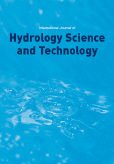
International Journal of Hydrology Science and Technology
Fostering Interdisciplinary Dialogue for Water Resource ManagementThe International Journal of Hydrology Science and Technology, published by InderScience Enterprises Ltd, is a distinguished platform dedicated to advancing knowledge in the field of hydrology, environmental engineering, and water science. With an ISSN of 2042-7808 and an E-ISSN of 2042-7816, this journal, established in 2011 and continuing through 2024, serves as an essential resource for researchers, professionals, and students alike. Despite being categorized in the Q3 quartile across multiple disciplines including Earth and Planetary Sciences, Environmental Engineering, Waste Management and Disposal, and Water Science and Technology, the journal maintains a reputation for contributing significant findings that impact both theory and practical applications in addressing hydrological challenges. Currently unavailable through Open Access options, the journal remains committed to disseminating valuable research that informs sustainable practices in water resource management. The editorial team encourages submissions that explore innovative strategies and methodologies while fostering interdisciplinary discussions, making this journal a pivotal player in shaping the future of hydrological science.

Carpathian Journal of Earth and Environmental Sciences
Exploring the Interplay of Geology and EnvironmentCarpathian Journal of Earth and Environmental Sciences is a distinguished academic journal dedicated to advancing the interdisciplinary field of Earth and environmental sciences. Published by the Carpathian Association for Environment and Earth Sciences, this journal plays a pivotal role in disseminating high-quality research focused on the dynamic interactions between geological processes and environmental changes. With an ISSN of 1842-4090 and an E-ISSN of 1844-489X, the journal is indexed in Scopus and holds an esteemed Q3 quartile ranking in both Earth and Planetary Sciences and Environmental Science categories as of 2023. Since its inception in 2008, the Carpathian Journal has provided an open access platform for researchers, professionals, and students to share insights, foster collaboration, and engage in critical discussions on pressing environmental issues. By continuously contributing to the body of knowledge in this field, the journal not only enhances academic discourse but also promotes sustainable environmental practices across Romania and beyond.
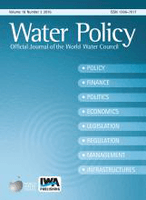
Water Policy
Fostering impactful discussions on water governance.Water Policy is a leading academic journal published by IWA PUBLISHING, dedicated to advancing the understanding of water management and policy across various disciplines. With a focus on the intricacies of water governance, the journal fosters dialogue among researchers and practitioners by presenting innovative studies and comprehensive analyses. Since transitioning to an Open Access model in 2021, it has increased accessibility to critical research, allowing for a broader reach and greater impact within the water sector. The journal's reputation is underscored by its classification in Q2 and Q3 quartiles in fields such as Geography, Planning and Development, as well as Environmental Science disciplines, marking it as a valuable resource for scholars and policymakers alike. The ISSN 1366-7017 and E-ISSN 1996-9759 facilitate streamlined access to its extensive archive, encouraging wider engagement in pivotal discussions surrounding sustainable water practices. With a commitment to shaping the future of water governance, Water Policy stands as an essential platform for sharing vital research and perspectives that contribute to effective water management globally.
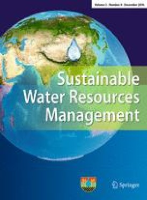
Sustainable Water Resources Management
Driving impactful practices for sustainable water resources.Sustainable Water Resources Management is an esteemed journal focusing on the critical field of water resource management in the context of sustainability. Published by Springer International Publishing AG, this journal serves as a vital platform for researchers, policymakers, and practitioners to disseminate cutting-edge research and innovative practices aimed at addressing global water challenges. With an impressive impact factor aligned with its Q2 ranking in Water Science and Technology and Q3 in Renewable Energy, Sustainability, and the Environment, it maintains a robust reputation in its field, evidenced by its Scopus rankings. Covering a diverse range of topics from integrated water resource management to the nexus between water and energy, Sustainable Water Resources Management is committed to fostering knowledge exchange and encouraging interdisciplinary dialogue among its audience. This journal, operating under strict academic rigor, plays an essential role in advancing sustainable practices and is open from 2015 to 2024, making it a relevant resource in today’s rapidly evolving environmental context.

Water
Unlocking the mysteries of water through collaborative science.Water, an esteemed journal published by MDPI, serves as a pivotal resource for global research in the fields of aquatic science, biochemistry, geography, and water science and technology. Since its inception in 2009, this open-access journal has committed itself to advancing knowledge regarding water-related topics by fostering a platform that encourages the dissemination of high-quality research. With its impressive impact factor reflecting its relevance and influence, Water ranks in the top quartiles in various categories, including Q1 in Aquatic Science and Water Science and Technology, showcasing its commitment to publishing cutting-edge findings that resonate deeply with the environmental and biological sciences community. Located in Basel, Switzerland, the journal prioritizes accessibility for researchers, professionals, and students alike, aligning with the broader scientific goal of addressing urgent water challenges through collaborative and interdisciplinary research.
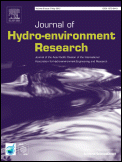
Journal of Hydro-environment Research
Exploring the intersection of engineering, chemistry, and water science.The Journal of Hydro-environment Research, published by Elsevier, serves as a leading platform for advancing knowledge in the fields of civil and structural engineering, environmental chemistry, and water science. With a robust impact factor reflecting its Q2 category ranking across various disciplines—including Environmental Engineering and Management, Monitoring, Policy and Law—it emphasizes high-quality research that addresses pressing environmental challenges. Embracing a global perspective, the journal explores interdisciplinary approaches to water and environmental management, thus empowering researchers and professionals to innovate and implement effective solutions. Since its inception in 2007, the journal has continually evolved, with its scope expanding into emerging areas pertinent to water science and technology. The journal is indexed in esteemed databases, ensuring wide dissemination and accessibility of published works, although it does not currently operate on an open access model. Addressing the intricate interplay between human activities and water resources, the Journal of Hydro-environment Research is quintessential for those dedicated to fostering sustainable practices and enhancing our understanding of hydro-environmental systems.
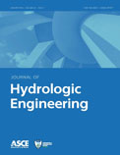
JOURNAL OF HYDROLOGIC ENGINEERING
Exploring the Future of Water EngineeringJOURNAL OF HYDROLOGIC ENGINEERING is a premier academic journal published by the ASCE - American Society of Civil Engineers, dedicated to advancing the field of hydrologic engineering through the dissemination of innovative research and methodologies. With an ISSN of 1084-0699 and E-ISSN 1943-5584, this journal serves a global audience and has established itself as an essential resource for professionals, researchers, and students in the civil and environmental engineering disciplines. Currently ranked in the Q2 category across multiple areas including Civil and Structural Engineering and Water Science and Technology, the journal promotes high-quality, peer-reviewed articles that address critical challenges in hydrology, water resources, and environmental management. Despite not being an open-access journal, it offers valuable insights that drive progress in sustainable engineering practices. The convergence of research from 1996 to 2024 makes it an invaluable archive for historical and cutting-edge contributions to the field, reflecting its commitment to fostering knowledge and innovation in hydrologic engineering.

Journal of Hydrology-Regional Studies
Driving impactful research in hydrology and water resources.Journal of Hydrology-Regional Studies, published by ELSEVIER in the Netherlands, stands as a leading open-access platform since 2014 for disseminating high-quality research in the fields of hydrology and water management. With an impressive impact factor and recognition as a Q1 journal in both Earth and Planetary Sciences and Water Science and Technology categories, it emphasizes regional studies that advance understanding of hydrological processes and their implications for sustainable management practices. The journal has established a significant global reach, evident from its Scopus rankings, which place it in the top percentiles within its disciplines, fostering a dynamic exchange of ideas among researchers, professionals, and students alike. By mobilizing critical insights and innovative solutions in hydrology, this journal aims to contribute to solving the pressing water-related challenges faced by our society.
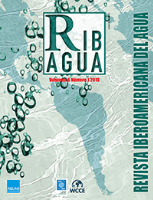
RIBAGUA-Revista Iberoamericana del Agua
Pioneering research in hydrology and environmental science.RIBAGUA-Revista Iberoamericana del Agua is an esteemed academic journal dedicated to the study and dissemination of water-related research within the Ibero-American context. Published by TAYLOR & FRANCIS LTD, this Open Access journal has been providing a platform for scholarly articles since 2015, promoting visibility and accessibility for researchers, professionals, and students engaged in environmental science, hydrology, and water resource management. With the objective of enhancing the understanding of water issues affecting the Ibero-American region, RIBAGUA invites contributions that address innovative practices, policy implications, and scientific advancements. By fostering inter-regional dialogue and collaboration, it stands as a vital resource for those looking to contribute to sustainable water management solutions. The journal is committed to maintaining high standards of academic integrity and is ideal for anyone seeking to advance their knowledge and research in the water sciences.

Hydrologie und Wasserbewirtschaftung
Exploring the depths of water management.Hydrologie und Wasserbewirtschaftung, published by the BUNDESANSTALT GEWASSERKUNDE-BFG, stands as a vital open access journal in the field of hydrology and water management since its inception in 1999. Based in Germany, this journal aims to disseminate high-quality research related to water resources, environmental sustainability, and innovative management strategies. Though it has a Q4 ranking in Water Science and Technology for 2023, and holds a Scopus rank of 113 out of 225, the journal provides an essential platform for researchers, professionals, and students interested in advancing their understanding of water science. With coverage spanning from 1999 to 2018 and a seamless move to an open access model, Hydrologie und Wasserbewirtschaftung remains committed to contributing to the ongoing dialogue around critical water issues. Researchers looking to publish their findings or stay abreast of developments in water science will find this journal indispensable.